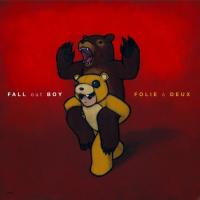Outside of his main gig as drummer for Fall Out Boy, Andy Hurley shares a house with four of his close friends that, due to a shared love of "Arrested Development," is called Fuck City. Thing is, the inhabitants of Fuck City -- why not? -- also go by the name of Fuck City. The spirit of Fuck City and its/their shenanigans is summed up in the following anecdote from Hurley's blog: "The best line ever said, eve⦠was said by our best friend, Irke. it had to do with setting a bunch of shit on fire...in the house, and Irke saying 'LET'S TAKE IT TOO FAR.' Haha. I wonder what too far would have consisted of." On these qualities alone, it's worth pointing out the irony that the new Fall Out Boy album also goes farâ¦but it doesn't go quite far enough. Irke may be disappointed right now.
It's not due to a lack of trying, though. The Chicago outfit's fifth album, Folie á Deux, is produced by Neal Avron, who has a track record in making big bands sound enormous. Whole string and horn sections add flavour to multiple songs. Pharrell Williams co-writes one song (the dance jam "w.a.m.s.") for the hell of it. Guests such as Debbie Harry, Lil Wayne, Elvis Costello and old friend Brendan Urie (Panic at the Disco) appear, usually only for a couple of lines. For goodness' sake, the title is "a madness shared by two" in French -- such unwavering commitment to the ridiculous has to be admirable (vocalist Patrick Stump even admits it on opening track "Disloyal Order of Water Buffalo": "Hey Doctor, I'm certifiable!"). You can't say that Fall Out Boy do things by halves.
But that's what brings Folie á Deux down. Where their previous album, Infinity on High, was fun, capturing a regular pop-punk band tinkering with all the toys major label money could buy, Folie can sometimes drag, mired down by its ambitions to make a Big Point. Case in point: "The (Shipped) Gold Standard," which attempts to address gay rights, the financial crisis and personal disillusionment in its lyrics and turns out overcooked. Lyricist / bassist / media tart / public whipping boy (etc.) Pete Wentz, a long-time advocate of twisty wordplay, can make good on his ambitions -- by eschewing his favourite topic (i.e. himself), "America's Sweethearts" becomes an enjoyably cynical take on the cult of celebrity, or even, as is rumoured, the Presidential election ("you can bow and pretend that you don't know you're a legend⦠/ I know you've heard this all before"); poignant album highlight "(Coffee's for Closers)" captures reluctantly growing old and disheartened with everything. "Change will come," sings Stump on the chorus, accompanied by a crescendo of strings, "But I will never believe in anything again." These are the good lines. When Wentz isn't focused, there's clunkers about pant-heatwaves, dating Roberta Flack and this line from "Gold Standard": "One time my Dad caught me a horseshoe crab / and I asked him if throwing it into the sea / would bring our luck back?" Which makes no sense. At all.
To crib an idea from Scott Heisel's review of the album, the sequencing places all the regular Fall Out Boy touchstones (sly pop-punk on "America's Sweethearts," car sing-alongs on "She's My Winona," barely restrained sex talk on "Headfirst Slide Into Cooperstown on a Bad Bet") on the first seven songs -- side A -- before the collaboration-heavy final six kicks in with "What a Catch, Donnie" -- side B. The first side's closer of "(Coffee's for Closers)" and "Donnie" are easily two of the best things this band have done, showcasing unabashed creativity and, yes, a shared madness. "Donnie" is from the Queen school of silly, drenched in slushy strings and pseudo-philosophical lyrics and closing with what is pretty much the entire Decaydance roster reprising choruses from previous Fall Out Boy songs. Oh, including Elvis Costello, who sings one line from "Headfirst Slide" before ghosting completely. (No Dan Yemin, sadly.) On the Unintentionally Hilarious Ideas scale, this potentially marks as a fifteen and two-thirds, but the whole thing is performed with such unsubtle panache that it works. Trouble is, from here there's really nowhere else to go. There's an odd lapse in energy after this one-two punch and even though there's some really good material remaining, a sense of disappointment clouds the second half of the album, not helped by the duff pub-rock experiment "27" and plodding finale "West Coast Smoker."
So, Folie á Deux is grand and ambitious, but not as grand and ambitious as you may want it to be (haters and fans alike). It's still a good power-pop record -- the musicianship has improved to the point that Fall Out Boy no longer sound like an actual band and less the Pete Wentz Show -- but where Infinity on High threw itself into Vegas pop with wild abandon, its followup only really dips its toes in. It skims the edge of madness.
Come back, Irke; all is forgiven.
